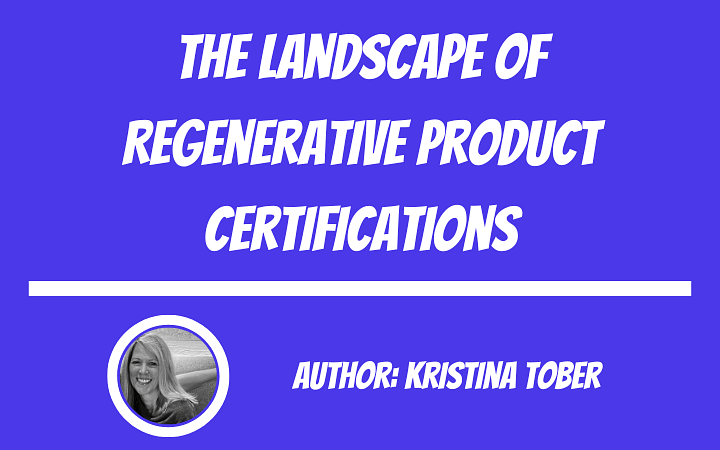
The Importance of Certification & Verification Programs
A recent study found that while 59% of consumers surveyed are familiar with “organic farming,” only 19% have heard of “regenerative ag.” This lack of understanding around the nutritional and planetary benefits of products made with regeneratively grown ingredients explains why two-thirds surveyed (66%) also said they won’t pay a premium for regenerative products.
This is where certification and verification programs can help, providing a number of important benefits:
1) Certifications make it easier for consumers to find regenerative brands
Let’s face it, consumers don’t want to grocery shop at the library (e.g., read everything on the box). They want a quick, clear picture of what a product offers and why it deserves a premium. They want to know what’s in it for them – whether that’s flavor, nutrition, convenience, or sustainability.
2) Certifications can help prevent greenwashing
Because regenerative ag is so loosely defined, and everyone from big ag to multinational CPG companies are laying claim to what it means, having well-defined, stringent certifications can prevent greenwashing and ensure that legitimate regenerative change is rewarded. This is becoming more important – particularly since regenerative ag is the fastest-growing claim in CPG.
3) Certifications can help brands justify a price premium
For over a decade, the International Food Information Council’s Food and Health Survey has tracked food purchasing patterns. Consistently, taste and price come first with environmental sustainability falling behind (68% vs. 39%). Health and wellness are close seconds. Even though environmental sustainability might not be a leading purchasing driver for the majority of consumers, there is data indicating it can be a great tool to drive price premiums.
Here’s where it gets interesting. McKinsey and NielsenIQ looked into the correlation between sales growth and sustainability, tracking actual revenue dollars instead of self-reported intention. What they found was strong evidence of a clear, material link between consumer spending and ESG claims as products with ESG claims saw higher growth (28%) than those without (20%).
4) Certifications can help educate consumers on the benefits of regenerative agriculture
This might be wishful thinking, particularly given that studies show consumer knowledge about what is “organic” is inconsistent, and about half of consumers don’t consider themselves very knowledgeable about genetically modified organisms (GMOs).
However, with consumers putting more dollars towards sustainable products, clearly labels matter. While consumers may not take the time to dig into what regenerative agriculture really means, perceiving that regen products have a positive effect on human and planetary health is enough to influence purchases.
5) Certifications can help retailers meet their sustainability goals and commitments
Whether it's Whole Foods or Walmart, many of the world's leading retailers are making sustainability commitments that revolve around emissions reduction, restoration of land, protection of natural resources, etc. There are many levers that these businesses can employ both inside and outside of their supply chains to support these goals, and having more third-party certified, regenerative brands on shelves for consumers to purchase should be a no-brainer way to help meet these urgent and lofty commitments.
Get to Know the Leading Labels
While many labels and certification schemes have proliferated in recent years, we are closely tracking 6 programs.
We believe these certification programs are currently receiving the appropriate level of attention from leading brands and retailers to potentially achieve mainstream adoption. Whole Foods Market has even published their stance on “regenerative product labeling” which includes 3 of the 6 certifications listed above as adequate for “prominent claims, seals or logos on the Principal Display Panel.”
-
- Regenerative Organic Certified® (ROC)
- Land to Market™ Verified
- Certified Regenerative by AGW
- Regenified™
- Soil & Climate Health Initiative Verified™
- Ethos Regenerative Outcome Verification™
Certification Details & Comparisons
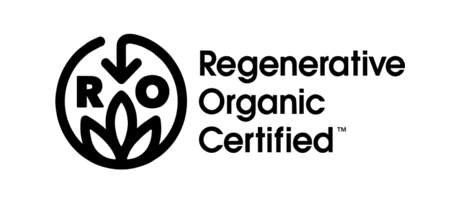
|
Certification: |
|
|
Who issues It? |
Regenerative Organic Alliance (ROA), a non-profit founded by the Rodale Institute, Dr. Bronner’s, Patagonia, and others. |
|
What’s required? |
ROC certification is practice-based. Operation/brand must:
ROC has three levels (Gold, Silver, & Bronze) and consists of three pillars:
|
|
What does it cost? |
Fee for verification, with costs based on size and scope of operation, geographic location, projected production value, and product claims. |
|
Brands |
55+ brands are ROC licensed, including CatSpring Youpon, Sol Simple, Dr. Bronner’s, Groundwork, Patagonia Provisions, Alexandre Family Farm, Recoup, Lotus Foods, Pocono Organics, and Wild Orchard. |
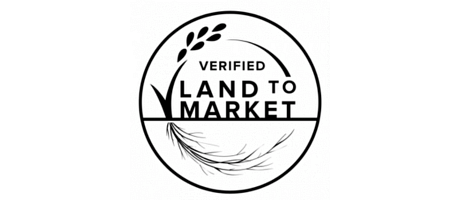
|
Certification: |
|
|
Who Issues It? |
Land To Market™, an organization created by the Savory Institute in 2018 to scale up the deployment of action-leadership around regenerative agriculture as rapidly as possible and on an international scale. |
|
What’s required? |
|
|
What does it cost? |
Operations/brands must become a member and pay a fee for verification. |
|
Brands |
1,000+ verified products and 80+ member brands hold Land to Market certification, including Alec's Ice Cream, White Oak Pastures, Force of Nature, Epic Provisions, Serenity Kids, Applegate, White Oak Pastures, Alexandre Family Farms, Timberland, Eileen Fisher, Onda Wellness. |
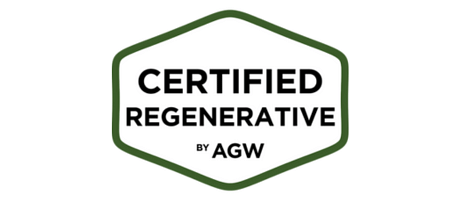
|
Certification: |
|
|
Who Issues It? |
A Greener World, a non-profit promoting practical, sustainable solutions in agriculture by supporting farmers and educating consumers. A Greener World offers a portfolio of farm certifications including Certified Animal Welfare Approved by AGW, Certified Grassfed by AGW, Certified Non-GMO by AGW, Certified Regenerative by AGW, and Certified Organic by AGW. |
|
What’s required? |
|
|
What does it cost? |
Fee schedule includes review fees for Certified Regenerative of $350, plus a $100 non-refundable application fee. |
|
Brands |
The a2 Milk® Company, Zack’s Mighty Tortilla Chips, Kreher Family Farms, Black Tansy Farm, and others. |
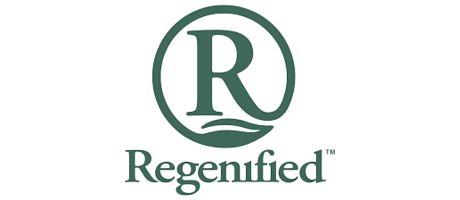
|
Certification: |
|
|
Who Issues It? |
Developed by regenerative agriculture thought-leaders and farmers Gabe Brown and Dr. Allen Williams who also founded Understanding Ag. |
|
What’s required? |
|
|
What does it cost? |
Premium commodity pricing |
|
Brands |
Launched in 2022, Regenified™ has certified a limited number of operations, including Nourished by Nature, Carman Ranch, Maker’s Mark's Star Hill Farm, and Union Grove Farm. |
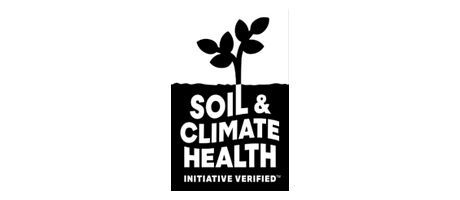
|
Certification: |
|
|
Who Issues It? |
Green America's Soil Carbon Alliance (SCI) SCI was designed in collaboration with a diverse group of stakeholders including The Carbon Underground, Ben & Jerry’s, Danone, MegaFood, and Green America’s Soil & Climate Alliance. It is part of the Center for Sustainability Solutions at Green America, a 501(c)(3) based in Washington, D.C. |
|
What’s required? |
|
|
What does it cost? |
Farmer transition to regenerative practices is supported by the SCI Farm Transition Fund, which is funded by companies making SCI commitments. |
|
Brands |
Nearly 50 farmers across 18 states have enrolled over 24,000 acres. Participating brands / companies include Danone, Ben & Jerry’s, Megafoods, Quinn, Banza, and others. |
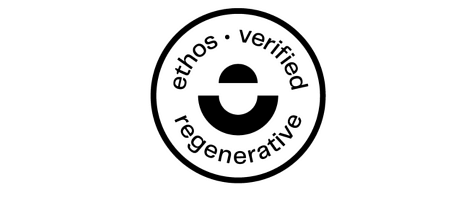
|
Certification: |
|
|
Who Issues It? |
Ethos was created by Terra Genesis International - an international regenerative design firm. |
|
What’s required? |
|
|
What does it cost? |
Supports data sovereignty via direct payment for data to the farmers, thus eliminating the common process of mark-ups via middlemen. Consequently, the verified product is not sold at a premium, but rather the data associated with the verification is sold as a separate product for brands’ use in impact monitoring and claims generation. |
|
Brands |
Piloted since 2020 and announced to the public in 2023, Ethos will not be available to a wider audience until 2024. Partner brands for pilot projects include The North Face, Timberland, and Vans. Verified projects include Haitian cotton, Thai rubber, and Ecuadorian cacao. |
Hi, I’m Kristina Tober 👋. I'm a writer and communications consultant helping agricultural organizations tell their story. For my boys, I hope we can all find common ground in regenerative agriculture and grow a better future.
Editor's Note: The views expressed in this article are the author's alone and do not necessarily represent those of the ReGen Brands platform or team.
